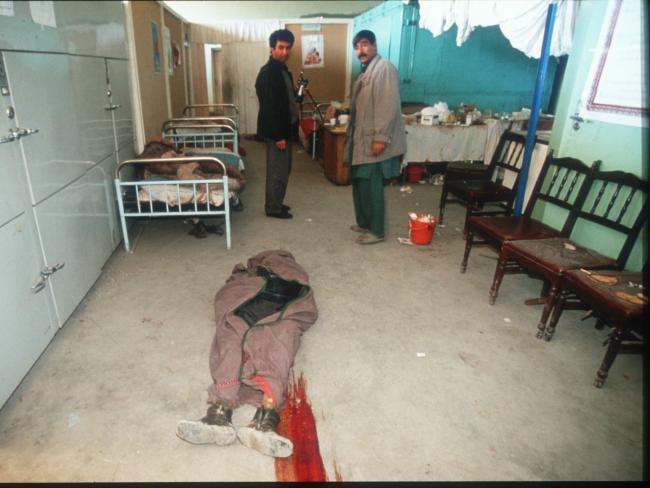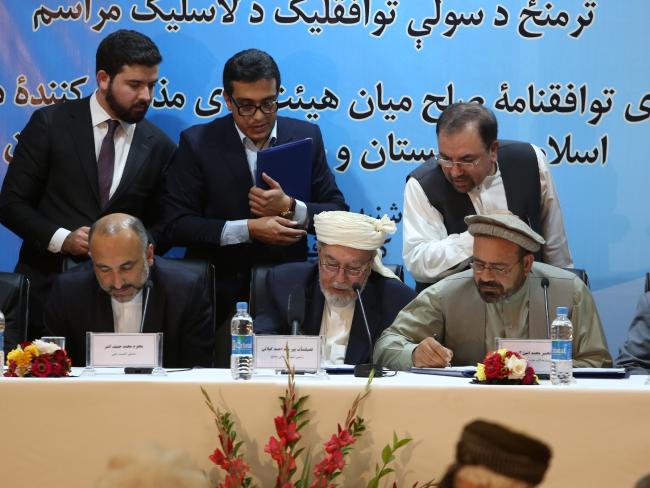Who is the 'Butcher of Kabul'? 2:23

Who is the 'Butcher of Kabul'? Gulbuddin Hekmatyar spent decades terrorising the people of Afghanistan before hiding in exile. Now he's making another run for politics.

Gulbuddin Hekmatyar giving an interview to AFP in Tehran in 2001. Afghanistan has signed a peace agreement with the notorious war lord. Picture: Behrouz Mehri
WARNING: Graphic imageHE’S been described as a sociopath and a warlord and stands accused of committing some of the most notorious war crimes in history.
Now the man dubbed “the Butcher of Kabul” has burst back into the world’s spotlight and this time he comes with terrifying new powers.
Gulbuddin Hekmatyar’s reputation as a cold-blooded killer began to gain solid ground in the early 1970s when he assassinated poet Saydal Sokhandan, a prominent Progressive Youth Organisation (PYO) activist at Kabul University.
By 1975, he founded the Hezb-i-Islami Afghanistan (HIA) based on a strictly disciplined Islamist ideology going on to become a prominent anti-Soviet commander in the 1980s.
But it wasn’t until the 1992-1996 civil war, where he is accused of killing 50,000 people, that earned him the moniker “the butcher of Kabul”.
Hekmatyar “almost single-handedly turned Kabul to rubble during the early 1990s, when as many as 50,000 people were slaughtered, and city was reduced from a metropolis of two million to perhaps 500,000 shell-shocked, ragged and half-mad survivors,” according to journalist Terry Galvin.
“During the post-Soviet anarchy and the rush for the spoils of war, Hekmatyar spent most of his time between 1992 and 1996 raining rockets and artillery shells on the people of Kabul, leaving the city a smoking tomb of as many as 50,000 corpses,” Galvin wrote.

Civilians move household goods to a safer area in Kabul, Afghanistan in 1994. Picture: Robert NickelsbergSource:Getty Images

The remains of a destroyed building stands in Kabul, Afghanistan in 1994. Picture: Robert NickelsbergSource:Getty Images

The civilian population endured extensive suffering when Kabul was the target of heavy weapon attacks killing thousands. Picture: Robert NickelsbergSource:Getty Images
BIN LADEN’S SAVIOUR, AND OTHER WAR CRIMES
“The Butcher” is responsible for numerous attacks on NATO troops, and was allegedly with Osama bin Laden at the time of the 9/11 attacks and helped him flee to Pakistan.
He declared his resistance to the US campaign in Afghanistan and criticised Pakistan for assisting them.
After the withdrawal of the Soviet Union, Afghanistan began to collapse and civil war between “mujahideen” — or war lords groups — started.
In a bid to quench his thirst for blood during the civil war, former warlord Burhanuddin Rabbani, who was President at the time, gave Hekmatyar the job of Prime Minister in 1992.
The agreement lasted just weeks.
In 1996 the rise of the Taliban forced Hekmatyar to leave his front and move into self-exile, first in Iran and then in Pakistan.
To this day, the United Nations lists his name on its global terrorist roster.
Yet in a strange turn of events, despite the serious accusations against him, Hekmatyar is apparently calling for peace.

Gulbuddin Hekmatyar pictured in Tehran in 2001.Source:AP
CAN HE BE TRUSTED?
Last week, Afghanistan signed a peace agreementwith the notorious war lord and his militant group, HIA, the second largest militant group in Afghanistan, paving the way for him to make a political comeback.
In an even scarier revelation, the wheels are in motion for the infamous figure to lead the next presidential candidacy, after the deal granted the alleged killer judicial immunity.
While details of the agreement are slim, it is believed the removal of his name from the UN terror list is also on the cards.
According to the agreement, the government will offer Hekmatyar legal immunity “in all past political and military proceedings” as well as release Hezb-i-Islami prisoners in exchange for a permanent ceasefire.
“I pray that our country be independent and sovereign, and our innocent and war-weary nation end the fighting and ongoing insecurity, and that unity prevails,” he said.
Hekmatyar, who heads the HIA group, is the latest in a series of controversial figures that Kabul has sought to reintegrate in the post-Taliban era by granting judicial immunity for past crimes.
WARNING: GRAPHIC IMAGE BELOW

The body of a Dostum fighter lies on the floor in a hospital in 1994 in Kabul, Afghanistan. Picture: Robert NickelsbergSource:Getty Images
SIGNIFICANT DEAL
The deal paves the way for him to make a comeback in mainstream politics in a pattern well established by other warlords, such as General Abdul Rashid Dostum, currently the country’s first vice president.
Human Rights Watch called the deal “an affront to victims of grave abuses”.
The organisation said in a statement: “[Hekmatyar’s] return will compound the culture of impunity that the Afghan government and its foreign donors have fostered by not pursuing accountability for the many victims of forces commanded by Hekmatyar and other warlords that laid waste to much of the country in the 1990s”.
A group of activists protested in Kabul holding placards portraying Hekmatyar with blood spilling from his mouth and a rocket piercing his nose. It read: “We cannot forgive the executioner of Kabul.”
“My three family members were killed during a rocket-launcher attack in Kabul during the 90s by HIA in which I lost my father and two cousins,” Noor Hussain, 67, told news.com.au.
Activist Raffie Aziz said : “Hekmatyar will provide shelter to the corrupt fighters and warlords. And create a mess in Kabul and around”.

An Afghan demonstrator holds a placard with an image of Gulbuddin Hekmatyar during a demonstration against him in a public park in Kabul, Afghanistan last month. Picture: Rahmat GulSource:AP
A spokesman for Hekmatyar, Haroon Zarghoon, said he was confident that in coming days global sanctions would be removed at the request of the Afghan government.
“There is no other way left for the America and allies except to give way to the Afghanistan’s most popular leader to come to Kabul and play his role in the stability and peace process in Afghanistan,” the spokesman said.
“America knows about the peace negotiations and they give its favour in his own interest.”
Sources close to Hekmatyar told news.com.au he will make stops around the country in an informal presidential election campaign, looking towards the 2019 elections.
“Afghanistan has been failing in negotiating peace with militant groups for the past 15 years, and this deal marks the first practical success in that regard,” Kabul-based analyst Haroun Mir told AFP.
“This could be a template for peace deals with other militant groups and marks an achievement for (Afghan President Ashraf) Ghani ahead of the Brussels” development aid conference in October, he added.
The deal is not likely to have an immediate impact on the security situation in Afghanistan, but worries for the future of the country and its citizens remain.

Amin Karim, representative of Gulbuddin Hekmatyar, second right, Ahmad Gilani head of Afghanistan's High Peace Council, centre, and Afghanistan national security adviser Mohammad Hanif Atmar, left, sign a peace agreement in Kabul last month. Picture: Rahmat GulSource:AP
— Mohammad Zubair Khan is a freelance reporter who writes for Vice, the Daily Telegraph in London and the BBC. Follow him on Twitter @hazarazubair
— Additional reporting by Matt Young







